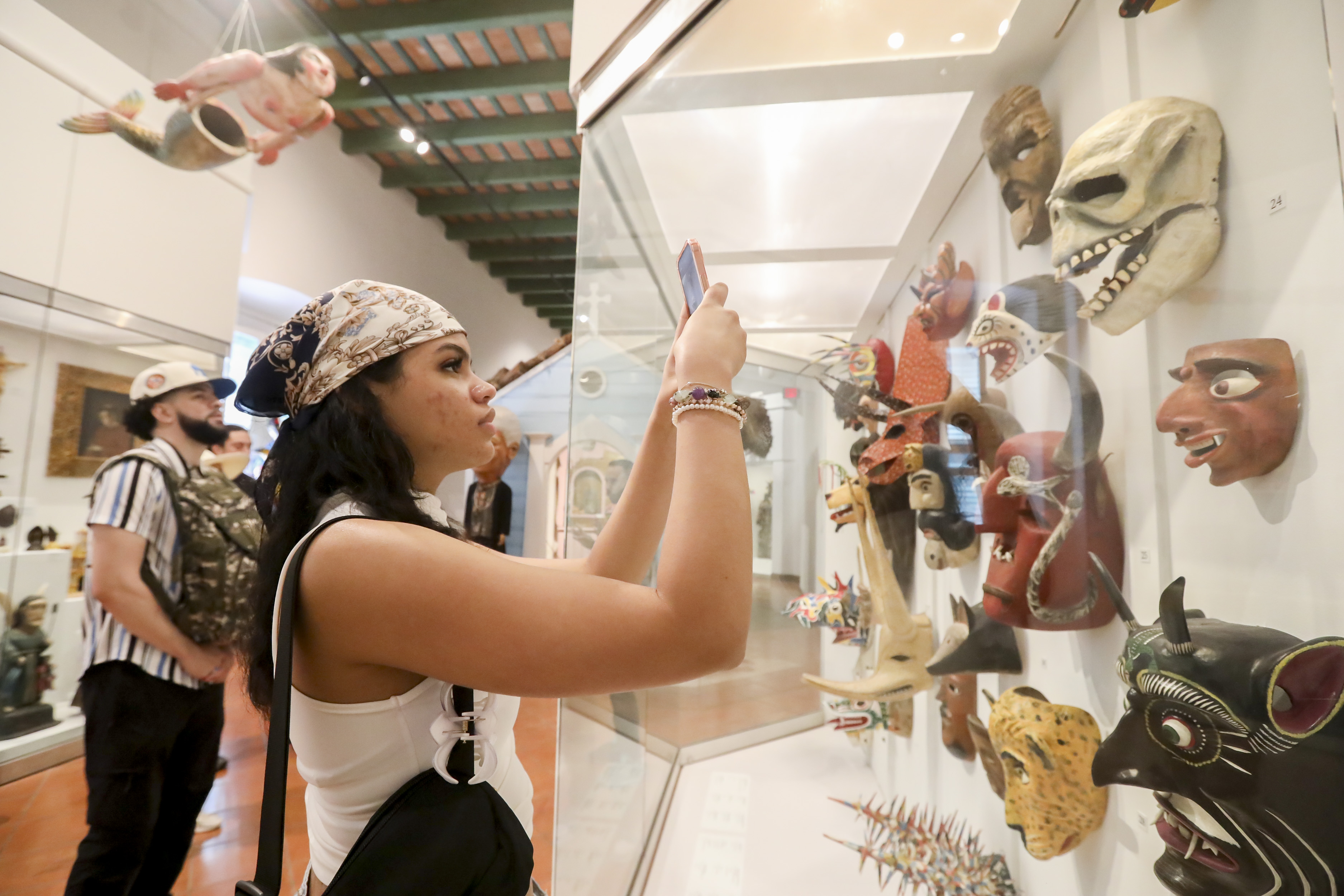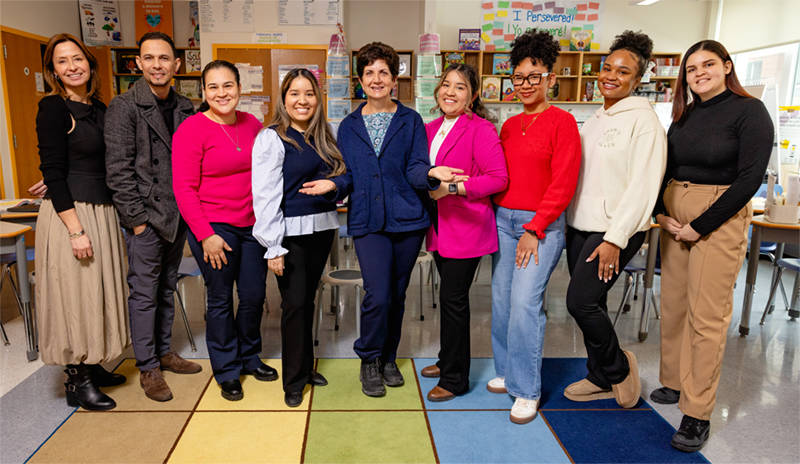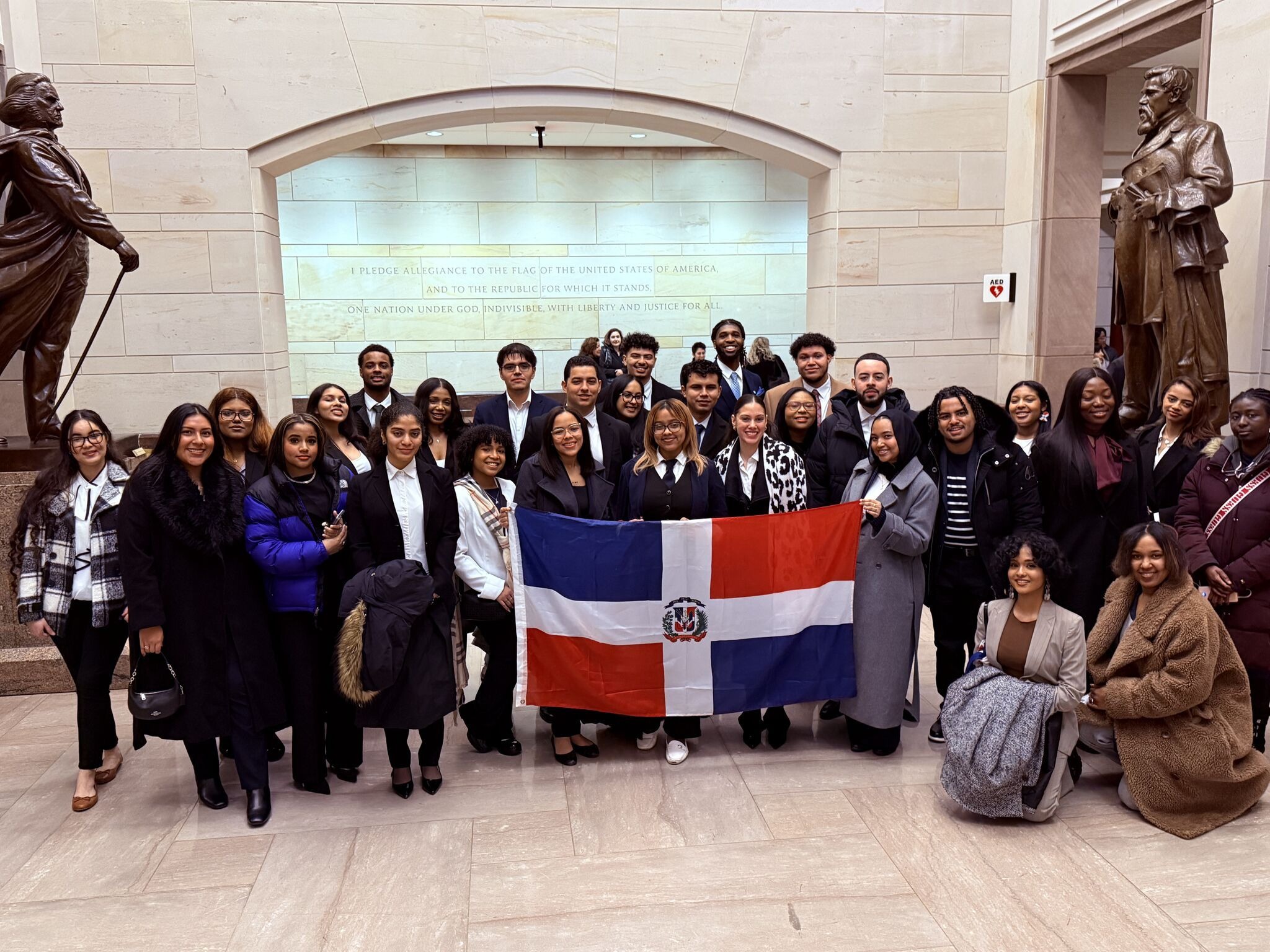- Lehman College >
- News >
- 2024 >
- Winter Term Hybrid Courses Make the World a Classroom
News
Search All News
Saturday, February 21, 2026
CONTACT
Office Hours
Monday - Friday 9am - 5pmClosed Sat. and Sun.
RELATED STORIES
February 19, 2026
Winter Term Hybrid Courses Make the World a Classroom

Lehman student Eilyn Scarlett Peña Robles takes a closer look at Afro-Caribbean ceremonial masks (Photo: Marisol Díaz-Gordon)
March 25, 2024
It was an international winter break for three groups of Lehman students, demonstrating the College’s focus on experiential and hybrid (Hy-Field) course offerings. Students travelled to Brazil, Puerto Rico, and Cuba for profound—even life-changing— learning experiences, said the students who took part.
The course, Global Citizenship and Community Engagement in Latino Communities, taught by Magdalena Sagardía of the Latin American and Latino Studies Department, included a 10-day trip to Puerto Rico. Students engaged directly with artists, performers, and institutions that produce Puerto Rican culture, while an online instructional component supplemented in-person experiences.
As a result, students developed a far more comprehensive view of the artistic diversity on the island than any book, website, or lecture could provide alone.
“One of the most rewarding experiences of my life was visiting the workshops of some amazing artists and seeing how they create their masterpieces,” said student Jency Fernández. “Most of the time, we only see the final product of an artist's vision, but there is so much more behind it. There is a story, a struggle, a journey, and a culture that shapes each piece of art.”
The project exceeded Sagardía’s expectations, she said, with “ten days of valuable conversations about art, humanities and how cultural institutions make their mark in their communities. There were profound intersections of various areas of study—literature, arts, ecology, performance—but also personal experiences which made the project all the more meaningful.”
Across the Caribbean, four students and three faculty members in the Department of Africana Studies spent 10 days in Cuba through CIVITAS, which facilitates Cuban study abroad and field experiences. The visit was organized by professor and department chair Bertrade Banoum.
With Little Havana as home base, participants took a deep dive into Afro-Cuban culture and history, visiting Cienfuegos, Matanzas, and Trinidad—once home to the country’s sugar industry and thousands of enslaved people who toiled in cane fields and refineries there.
Students also presented at the 28th Scientific Workshop of Afro-American Social and Cultural Anthropology, an academic conference held at Little Havana’s Casa de Africa.
The trip became the platform for participants’ independent study projects this semester.
“I think this will shape my research a great deal, because I will be able to connect my Africana Studies degree to my real-life experience in Cuba,” said senior Sierra Lebron. “I have officially presented at an international conference, and I feel like a scholar.”
Read more about the trip from Lehman student Aminata Gueye, whose reflections were published on the CIVITAS website.

From left, Africana Studies Professor Bertrade Banoum, adjunct lecturer Chanta Palmer, and students Kilah St. Fort, Nora Antwi, Aminata Gueye, and Sierra Lebron.
Below the equator in São Paulo, Brazil, three Lehman students earning their master’s degrees in speech-language pathology spent a week working with the University of Santa Casa’s PECA program. It’s an annual collaboration between the institution’s medical school, nursing school, and Department of Speech-Language Pathology and Audiology that brings together student volunteers and faculty to serve people in remote, high-need areas.
Each year, the six-day program averages 2,000 consultations.
The trip was a component of an elective course, Global Initiatives in Speech-Language Pathology, taught by Caroline Spelman, associate director of Clinical Education and Clinical Services.
Students worked daily from 8 a.m. to 6 p.m. rotating between an audiology suite, adult clinic, pediatric clinic, and home visits, for an intense week of learning on the job.
“Every day we were placed in a different clinic and got hands-on experience working with clients,” said student Ivanova Marte.
Working in another culture also broadened students’ perspective on the field. Marte was impressed by her encounters with Deaf patients. “In Brazil, speech pathologists are required to learn sign language, and we saw first-hand how important it is to learn sign language and be able to communicate with people from the Deaf community.”
The cultural exchange was instrumental to honing both clinical skills and the social or “soft” skills that all practitioners need.
“The students represented Lehman, our field, and our country so beautifully,” said Spelman. “The Brazilian students were impressed, and the faculty embraced us.”
Spelman and student Yahlenah Cruz discussed their experience in a recent video.
The department hopes to establish an exchange agreement with the University of Santa Casa so that more students can benefit from experiential, community-engaged learning.
“There is an upward trend in service-learning in allied health and medicine,” said Spelman. “We want this to be sustainable, and for Brazilian students to come to the Bronx and learn from our program as well.”
All three of these programs are considered Hy-Field instruction, an emerging mode of remote learning that uses on-location experiences in the curriculum. In addition to traditional course activities, classes may include career development projects, community-based service-learning, or field research and travel.
The term was coined at Baruch College, which, like Lehman, has been expanding these offerings in conjunction with the University’s increasing focus on experiential learning opportunities.
Learn more about community-engaged learning opportunities at home and abroad by visiting the Office of International Programs and Community Engagement.









